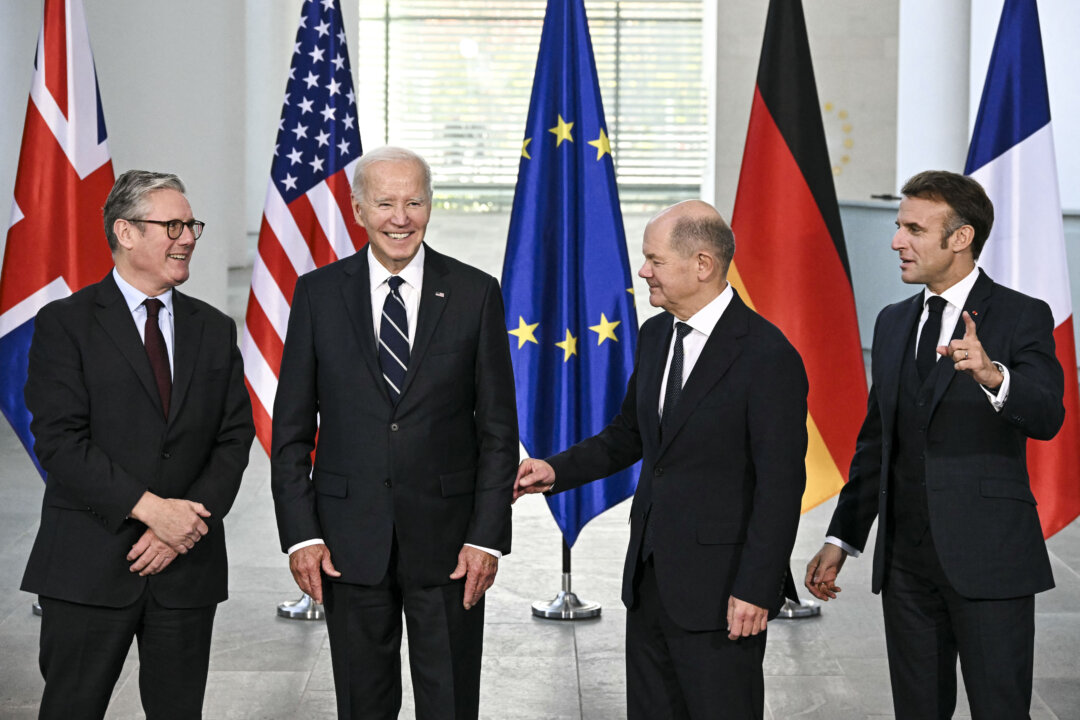President Joe Biden meets with international leaders in Germany to plan for the long-term support of Ukraine.
President Joe Biden is urging the United States’ European allies to continue supporting Ukraine as he prepares to leave office in January.
Biden is currently in Germany, where he met with German Chancellor Olaf Scholz, French President Emmanuel Macron, and UK Prime Minister Keir Starmer on Oct. 18. The four discussed Ukraine and the future of the expanding conflict in the Middle East.
The meeting follows the group’s one-on-one discussions with Ukrainian President Volodymyr Zelenskyy over the last several weeks, in which he privately laid out his plan for a Ukrainian victory in the ongoing war with Russia.
White House national security adviser Jake Sullivan told reporters on Air Force One on Oct. 17 that Biden would work with the three leaders to further ensure long-term support for Ukraine after he left office.
“What the president is trying to do is to make our commitment to Ukraine sustainable and institutionalized for the long term,” Sullivan said.
The meeting also comes just weeks ahead of the closely contested U.S. presidential election, which could result in drastic changes to U.S. foreign policy.
On the one hand, Vice President Kamala Harris, the Democratic presidential nominee, has suggested continuing the United States’ current policy of providing security assistance to Ukraine and leveraging economic sanctions against Russia.
Republican presidential nominee and former President Donald Trump, meanwhile, has vowed to end the war as soon as possible and raised concerns that the continuation of the conflict could result in a world war between Russia and the nuclear powers providing aid to Ukraine.
To that end, Washington’s NATO partners are making efforts to demonstrate their resolve to support Ukraine’s defense, with or without the might of the United States.
“Our position is clear: We are supporting Ukraine as strongly as possible,” Scholz said. “At the same time, we are taking care that NATO does not become a party to the war so that this war doesn’t culminate in an even bigger catastrophe.
“We will stand beside Ukraine as long as it is necessary.”
With the future of U.S. support for Ukraine and possibly NATO itself in question, the alliance’s European members have moved to ensure it can continue to maintain Ukraine’s defense against the ongoing Russian invasion.
NATO unveiled the creation of a new command in July, for example, which will be led by a three-star NATO general from Europe who will oversee the training, equipping, and force development of Ukrainian troops.
Likewise, the alliance is establishing an office for a NATO representative to be stationed in Kyiv to deepen Ukraine’s institutional relationship with the alliance.
Both are elements of a wider suite of projects designed to prepare Ukraine for assuming its responsibilities in NATO should it eventually be admitted to the alliance, which the NATO leader previously described as a “bridge to membership.”
Ukraine cannot currently join NATO for a number of reasons, including the fact that it does not maintain territorial integrity and does not have the unanimous support of all 32 member countries.
Ukraine is unlikely to garner the necessary support for membership anytime soon, given the hesitancy of some nations, such as Hungary and Turkey, to engage in what they consider deliberately provocative actions toward Russia.
Russian President Vladimir Putin has said that Ukraine should be required to agree to never join NATO as a condition for peace.
When asked about the possibility that Trump could attempt to force Ukraine into accepting Russia’s terms, White House National Security Council spokesperson John Kirby told reporters on Oct. 18 that the Biden administration would do everything in its power to ensure a “just peace” in line with Zelenskyy’s wishes.
“It’s critical that, whatever that peace looks like, it has to be acceptable to him [Zelenskyy] and to the Ukrainian people, and we’re certainly not going to have any discussions about Ukraine without Ukraine,” he said.
Kirby added that Biden’s talks with foreign leaders this week were not explicitly about the upcoming U.S. elections but about “showing his gratitude” for the allies’ continued support and engaging in “policy-heavy discussions” about collective security.
To that end, Kirby said that reaffirming U.S. support for NATO and Ukraine as a future NATO member is paramount to global security.
“American leadership matters to leaders here,” Kirby said. “The United States matters.
“NATO is going to be in Ukraine’s future. No question about it. The first thing we have to do is help them win this war.”

